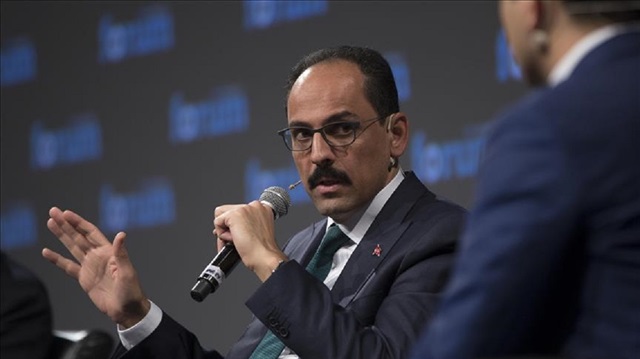
In PKK/PYD/YPG-controlled areas, refugees know they will face oppression, persecution, and even death, says Ibrahim Kalin
Though tens of thousands of Syrian refugees have returned to their homes in areas rid of Daesh, they do not want to return to areas controlled by the terrorist PYD/YPG, the Syrian branches of the terrorist PKK, a Turkish presidential spokesman said Wednesday.
Ibrahim Kalin said that Turkey liberated more than 2,000 square kilometers of territory from Daesh during Operation Euphrates Shield, which started last August and ended this March, and that around 100,000 Syrian refugees have since returned to their homes.
Kalin spoke to news channel TRT Haber on the sidelines of the TRT World Forum in Istanbul, of which Anadolu Agency is the global communication partner.
“Syrian refugees do not want to return to PYD/YPG-controlled areas, because they know that they will face oppression, persecution, and even death in PYD/YPG controlled areas,” Kalin said.
The PKK/PYD/YPG has been accused by human rights groups of committing significant human rights violations in northern and northeastern Syria, including "ethnic cleansing" massacres.
More than 1,200 people, including security force personnel and civilians, have lost their lives since the PKK -- listed as a terrorist organization by Turkey, the U.S., and EU -- resumed its decades-old armed campaign in July 2015.
On Turkey’s current presence in Idlib, northwestern Syria, Kalin said that Turkey has been fighting various terrorist groups, including Daesh and Hayat Tahrir al-Sham.
“We cannot close eyes when there are attacks targeting civilians,” he also said.
The Idlib operation was launched under a May deal between Turkey, which backs groups opposed to Syrian leader Bashar al-Assad’s regime, and Russia and Iran, who support Assad.
The agreement -- signed during peace talks in the Kazak capital Astana -- aims to establish a number of de-escalation zones to ensure the continuation of a cease-fire deal reached last December between the three guarantor nations.
The de-escalation zones were created to enhance the effectiveness of the cease-fire, end conflicts, bring humanitarian aid to those in need, and establish necessary conditions for the return of those displaced.
Turkey’s latest military intervention follows Operation Euphrates Shield, which saw the Free Syrian Army, backed by Turkish forces, clear Daesh from territory in northern Syria.
Syria has remained locked in a vicious civil war since early 2011, when the Assad regime cracked down on pro-democracy protests with unexpected ferocity.
Turkey hosts more than 3 million Syrian refugees -- more than any other country in the world. The country has spent around $30 billion helping and sheltering refugees since the beginning of the Syrian civil war.
Turning to recent events in northern Iraq, Kalin said that Turkey has long supported the Kurdish Regional Government (KRG), including during its darkest days.
“We have no problem with Iraq’s Kurds. Our only problem is the referendum,” he added, referring to the KRG’s illegitimate independence referendum held late last month.
Stating that Turkey’s aim is to protect Iraq’s unity, integrity, and political solidarity, he said that it has no intention of harming Iraq’s Kurds.
On Sept. 25, the illegitimate referendum was carried out in the three provinces allocated to KRG control under the Iraqi Constitution as well as disputed areas such as Kirkuk, which was seized by KRG forces in 2014 as Daesh drove out Iraqi government troops.
The referendum was condemned by all regional powers except for Israel, as well as the UN and U.S.
Most warned it would distract from the fight against terrorism and further destabilize the region.
Hello, the comments you share on our site are a valuable resource for other users. Please respect other users and different opinions. Do not use rude, offensive, derogatory, or discriminatory language.
The floor is all yours.








